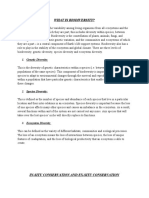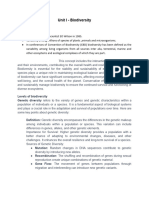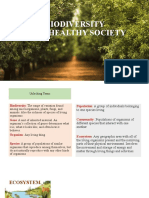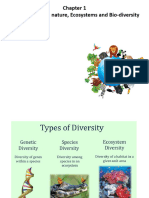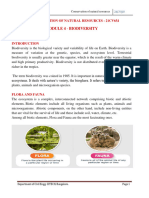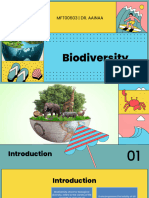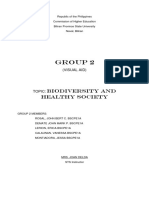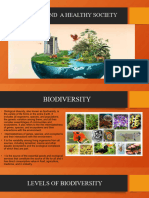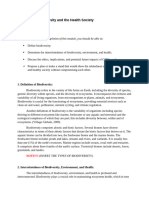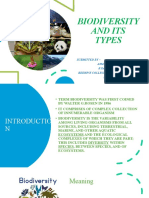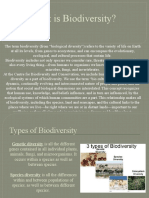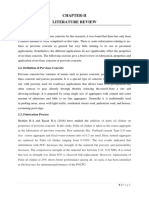0 ratings0% found this document useful (0 votes)
16 viewsWahhhhhhhhhhhhhhhhhhhh
Wahhhhhhhhhhhhhhhhhhhh
Uploaded by
John Calvin GerolaoBiodiversity provides both consumptive and non-consumptive benefits. Consumptive benefits include food, fuel, medicine, better crop varieties, and industrial materials that humans directly use. Non-consumptive benefits include recreation, education and research, traditional value for communities, and essential ecological services like climate regulation, waste degradation, and carbon sequestration that support all life on Earth. Losing biodiversity threatens these services and therefore humanity itself.
Copyright:
© All Rights Reserved
Available Formats
Download as DOCX, PDF, TXT or read online from Scribd
Wahhhhhhhhhhhhhhhhhhhh
Wahhhhhhhhhhhhhhhhhhhh
Uploaded by
John Calvin Gerolao0 ratings0% found this document useful (0 votes)
16 views3 pagesBiodiversity provides both consumptive and non-consumptive benefits. Consumptive benefits include food, fuel, medicine, better crop varieties, and industrial materials that humans directly use. Non-consumptive benefits include recreation, education and research, traditional value for communities, and essential ecological services like climate regulation, waste degradation, and carbon sequestration that support all life on Earth. Losing biodiversity threatens these services and therefore humanity itself.
Original Description:
assignment
Original Title
wahhhhhhhhhhhhhhhhhhhh
Copyright
© © All Rights Reserved
Available Formats
DOCX, PDF, TXT or read online from Scribd
Share this document
Did you find this document useful?
Is this content inappropriate?
Biodiversity provides both consumptive and non-consumptive benefits. Consumptive benefits include food, fuel, medicine, better crop varieties, and industrial materials that humans directly use. Non-consumptive benefits include recreation, education and research, traditional value for communities, and essential ecological services like climate regulation, waste degradation, and carbon sequestration that support all life on Earth. Losing biodiversity threatens these services and therefore humanity itself.
Copyright:
© All Rights Reserved
Available Formats
Download as DOCX, PDF, TXT or read online from Scribd
Download as docx, pdf, or txt
0 ratings0% found this document useful (0 votes)
16 views3 pagesWahhhhhhhhhhhhhhhhhhhh
Wahhhhhhhhhhhhhhhhhhhh
Uploaded by
John Calvin GerolaoBiodiversity provides both consumptive and non-consumptive benefits. Consumptive benefits include food, fuel, medicine, better crop varieties, and industrial materials that humans directly use. Non-consumptive benefits include recreation, education and research, traditional value for communities, and essential ecological services like climate regulation, waste degradation, and carbon sequestration that support all life on Earth. Losing biodiversity threatens these services and therefore humanity itself.
Copyright:
© All Rights Reserved
Available Formats
Download as DOCX, PDF, TXT or read online from Scribd
Download as docx, pdf, or txt
You are on page 1of 3
BENEFITS AND IMPORTANCE OF BIODIVERSITY
All organisms found in an
ecosystem including human beings
are part of
the network of life. Each species of
plant, insect, and animal has a
place on earth and has a vital role
in the web of life. These species
interact with and depend upon each
other either for food, shelter, or
oxygen.
Sustaining a vast diversity of species in an ecosystem is essential to
preserve the network that supports all living things. Thus, “it is reckless
to assume that biodiversity can be diminished indefinitely without
threatening humanity itself” (Wilson, 1992).
BENEFICIAL EFFECTS OF BIODIVERSITY
A. Consumptive Value – pertains to the direct utilization or
consumption of goods by humans. Consumptive value refers to
the inherent usefulness or direct utility that goods provide to
humans through their consumption or utilization. It is a measure
of the practical benefits derived from consuming or using certain
products.
The following examples illustrate the different aspects of
consumptive value
This includes:
• Food/drinks- Biodiversity plays a crucial role in providing a
diverse range of food and beverages. Different plant and animal
species contribute to the production of crops, fruits, vegetables,
seafood, and spices. The genetic diversity within species also
allows for the development of improved varieties with desirable
traits, such as disease resistance or higher yields.
• Fuel- Some biofuels, such as ethanol and biodiesel, are
derived from organic matter, including plants and algae.
Biodiversity contributes to the availability of biomass resources
used for producing renewable energy. Additionally, certain
microorganisms are involved in the production of biogas through
anaerobic digestion.
• Medicine- Many pharmaceutical drugs and traditional
medicines are derived from natural sources, including plants,
animals, and microorganisms. Biodiversity provides a vast array
of chemical compounds with potential medicinal properties.
Exploration and study of diverse ecosystems can lead to the
discovery of new drugs and treatments for various diseases.
• Better crop varieties- Biodiversity is essential for improving
crop varieties through crossbreeding and hybridization. Genetic
diversity within crops allows for the selection and breeding of
plants with desirable traits, such as increased yield, resistance
to pests and diseases, and tolerance to environmental stresses.
• Industrial materials- Biodiversity provides various raw materials
used in industries. For example, timber and fibers from different
tree species are used in construction, furniture-making, and the
production of paper and textiles. Other natural resources like
rubber, resins, and oils have industrial applications as well.
B. Non-consumptive Value – refers to all the functions and
services that biodiversity offers, without involving the direct
utilization or consumption of goods. These values are often
related to the ecological processes and interactions within
ecosystems.
This includes:
• Recreation- Biodiversity offers opportunities for recreational
activities and outdoor experiences. People can engage in
activities such as hiking, wildlife watching, birding, camping, and
nature photography. These activities promote physical and
mental well-being, foster a connection with nature, and provide
leisure and enjoyment.
• Education and Research- Biodiversity serves as a valuable
educational and research resource. Studying diverse species
and ecosystems deepens our understanding of ecological
processes, evolution, and the interconnections within
ecosystems. Biodiversity provides a rich context for scientific
research, environmental studies, and conservation efforts. It
also supports educational programs, such as nature
interpretation, environmental education, and awareness
campaigns.
• Traditional Value- Biodiversity holds cultural and traditional
significance for many communities around the world. Indigenous
peoples and local communities often have deep connections to
specific species, ecosystems, and landscapes. Biodiversity
plays a role in their traditional practices, ceremonies, folklore,
and knowledge systems, passing down wisdom about the
natural world from one generation to another.
• Ecological Services- Biodiversity plays a critical role in
providing ecological services, which are the benefits that
ecosystems offer to both humans and other organisms. These
services are essential for the functioning and well-being of
ecosystems.
This includes:
➢ Balance of Nature
➢ Biological Productivity
➢ Regulation of Climate
➢ Degradation of Waste
➢ Cleaning Air and Water
➢ Cycling of Nutrients
➢ Control of Potential Pests and Disease-Causing Species
➢ Detoxification of Soil and Sediments
➢ Stabilization of Land against Erosion
➢ Carbon Sequestration and Global Climate Change
➢ Maintenance of Soil Fertility
You might also like
- Week 13 - Biodiversity and The Healthy Society (Draft)Document6 pagesWeek 13 - Biodiversity and The Healthy Society (Draft)francis dungcaNo ratings yet
- What Is Biodiversity?: 1. Genetic DiversityDocument4 pagesWhat Is Biodiversity?: 1. Genetic DiversityBella EstherNo ratings yet
- Tuba End SemDocument26 pagesTuba End Semshivansh19tNo ratings yet
- Biodiversity and Healthy SocietyDocument35 pagesBiodiversity and Healthy SocietyiammiriamsisonNo ratings yet
- BiodiversityDocument1 pageBiodiversityelizabethlijayes101No ratings yet
- Ark Note 2Document18 pagesArk Note 2Nusrat ShoshiNo ratings yet
- BIODIVERSITYDocument80 pagesBIODIVERSITYGee Lysa Pascua VilbarNo ratings yet
- BiodiversityDocument32 pagesBiodiversityEllecarg Cenaon CruzNo ratings yet
- Biodiversity ...........Document14 pagesBiodiversity ...........Pratiksha JadhavNo ratings yet
- BiodivesityDocument3 pagesBiodivesityanshul0714No ratings yet
- Biodiversity and ConservationDocument6 pagesBiodiversity and Conservationrakesh.lilasiNo ratings yet
- Biodiversity and The Healthy Society: Intended Learning OutcomesDocument6 pagesBiodiversity and The Healthy Society: Intended Learning OutcomesReyy ArbolerasNo ratings yet
- Biodiversity Conservation in IndiaDocument20 pagesBiodiversity Conservation in Indiaadeeba showkatNo ratings yet
- Unit I Biodiversity Notes - 1Document23 pagesUnit I Biodiversity Notes - 1Durga DamleNo ratings yet
- Environment Al Science: Presented byDocument16 pagesEnvironment Al Science: Presented byNargis NajumuNo ratings yet
- As 110 & Ae 23 Group 8Document25 pagesAs 110 & Ae 23 Group 8Richan RulogNo ratings yet
- Biodiversity and conservation (1)Document6 pagesBiodiversity and conservation (1)4L Anisha SieudassNo ratings yet
- NarrativereportDocument57 pagesNarrativereportSean Carlo LopezNo ratings yet
- Biodiversity ModuleDocument8 pagesBiodiversity ModuleFundae DesignsNo ratings yet
- Biodiversity and A Healthy SocietyDocument33 pagesBiodiversity and A Healthy SocietyMarc Geoffrey HababNo ratings yet
- Biodiversity IN India: By-Nikita MazgaonkarDocument54 pagesBiodiversity IN India: By-Nikita MazgaonkarAr ManiNo ratings yet
- Module 4 PDFDocument32 pagesModule 4 PDFdeepak100% (1)
- Bio Diversity and Its ConservationDocument32 pagesBio Diversity and Its Conservationsai krishna chakkaNo ratings yet
- Biodiversity and The Healthy Society HO 1Document6 pagesBiodiversity and The Healthy Society HO 1Johoney MarceloNo ratings yet
- Unit-3- Biodiversity-1.pptxDocument25 pagesUnit-3- Biodiversity-1.pptx16v.harshiniNo ratings yet
- (STS) Semifinal Coloring BookDocument8 pages(STS) Semifinal Coloring BookJudy Lou CortesNo ratings yet
- BiodiversityDocument22 pagesBiodiversityGurmeet SinghNo ratings yet
- Biodiversity and A Healthy SocietyDocument33 pagesBiodiversity and A Healthy SocietyJamaica DavidNo ratings yet
- BDDocument207 pagesBDGebretsadik Melak GionianNo ratings yet
- STS Module 12 Biodiversity and The Healthy Society EnhancedDocument44 pagesSTS Module 12 Biodiversity and The Healthy Society EnhancedRyan Fernandez Dela Cruz100% (1)
- Evs Semester 3RD Notes in English MediumDocument55 pagesEvs Semester 3RD Notes in English MediumYes TheoryNo ratings yet
- ENVIRONMENTAL EducationDocument14 pagesENVIRONMENTAL EducationJapleen ChadhaNo ratings yet
- Project BioDocument17 pagesProject Biogovind717w76No ratings yet
- Chapter 1 3 Hotspots and BiodiversityDocument19 pagesChapter 1 3 Hotspots and BiodiversitybhanuNo ratings yet
- CNR Module 4.1 NotesDocument29 pagesCNR Module 4.1 Notesgaya3devi.2003bNo ratings yet
- Biodiversity and The Healthy SocietyDocument24 pagesBiodiversity and The Healthy SocietyLore Anne Mhae SantosNo ratings yet
- UMK Biodiversity Semester 2Document38 pagesUMK Biodiversity Semester 2Rina Abigail CarterNo ratings yet
- Lecture 1 (Part I)Document19 pagesLecture 1 (Part I)f22b0054No ratings yet
- Group 2: Biodiversity and Healthy SocietyDocument4 pagesGroup 2: Biodiversity and Healthy SocietyCelia Theresa DelimaNo ratings yet
- BIODIVERSITY1Document10 pagesBIODIVERSITY1anglegend123No ratings yet
- Biodiversity and Healthy Society and GMODocument44 pagesBiodiversity and Healthy Society and GMOmelNo ratings yet
- Untitled DocumentDocument14 pagesUntitled DocumentGaurav GNo ratings yet
- Biodiversity and health soceityDocument2 pagesBiodiversity and health soceitykrisha BattungNo ratings yet
- Asmita RawatDocument14 pagesAsmita RawatasmiNo ratings yet
- Module 4Document30 pagesModule 4Harshith Kumar hvNo ratings yet
- Biodiversity Conservation: Thecla M. MutiaDocument9 pagesBiodiversity Conservation: Thecla M. Mutiahsdf,asghNo ratings yet
- 6977 47.2 2cypDocument2 pages6977 47.2 2cypOKMM AFZAL NAWAZNo ratings yet
- 8 Main Values of Biodiversity - ExplaiDocument9 pages8 Main Values of Biodiversity - ExplaiDiju ChoudhuryNo ratings yet
- Lecture On Biodiversity: Introduction To Environmental ScienceDocument70 pagesLecture On Biodiversity: Introduction To Environmental ScienceJubair Syed100% (1)
- Meve 14Document9 pagesMeve 14Prime VideoNo ratings yet
- Biodiversity SsDocument11 pagesBiodiversity Ss115trezNo ratings yet
- Biodiversity in India-ProjectDocument54 pagesBiodiversity in India-ProjectVarun Sawant83% (6)
- Biweekly - Biodiversity and Its ConservationDocument11 pagesBiweekly - Biodiversity and Its ConservationPriyanka SharmaNo ratings yet
- What Is Biodiversity?: Genetic DiversityDocument2 pagesWhat Is Biodiversity?: Genetic DiversityMr RamNo ratings yet
- Chapter 9 STSDocument33 pagesChapter 9 STSDemarie JunasNo ratings yet
- What Is Biodiversity?: 1. Source of FoodDocument3 pagesWhat Is Biodiversity?: 1. Source of FoodJeanne Mari CostalesNo ratings yet
- Finals StsDocument14 pagesFinals Ststrishamae demesaNo ratings yet
- Biodiversity ESTDocument7 pagesBiodiversity ESTsahil bhoirNo ratings yet
- Module PDFDocument10 pagesModule PDFGievel Enoroba LopezNo ratings yet
- Heirloom Gardening and Biodiversity_ Cultivating a Time : Honored Legacy for a Sustainable FutureFrom EverandHeirloom Gardening and Biodiversity_ Cultivating a Time : Honored Legacy for a Sustainable FutureNo ratings yet
- Fabm 2Document3 pagesFabm 2John Calvin GerolaoNo ratings yet
- Fabm Week 1 Asnd 2Document5 pagesFabm Week 1 Asnd 2John Calvin GerolaoNo ratings yet
- Business Mathematics 4TH Quarter Week 3Document4 pagesBusiness Mathematics 4TH Quarter Week 3John Calvin GerolaoNo ratings yet
- BUSINESS FINANCE Dipa TaposDocument7 pagesBUSINESS FINANCE Dipa TaposJohn Calvin GerolaoNo ratings yet
- Food Technology Coursework 2014Document7 pagesFood Technology Coursework 2014afjwfealtsielb100% (2)
- การเคลื่อนที่ของสิ่งมีชีวิตDocument1 pageการเคลื่อนที่ของสิ่งมีชีวิตธีรนัย เสารางทอยNo ratings yet
- Writing A For and Against Essay: Some Tips and SuggestionsDocument15 pagesWriting A For and Against Essay: Some Tips and SuggestionsJulia100% (1)
- Expression of Congratulations and Responding To CongratulationsDocument48 pagesExpression of Congratulations and Responding To Congratulationsyusi febriyanti14No ratings yet
- Active RecreationDocument2 pagesActive RecreationJenne Santiago BabantoNo ratings yet
- Metal Siding Deflection LimitDocument1 pageMetal Siding Deflection Limitwaweng22No ratings yet
- 6 Log InterpretationDocument5 pages6 Log InterpretationMostafa IbrahimNo ratings yet
- 1.clinical Decision MakingDocument5 pages1.clinical Decision MakingRoshin Mae E. TejeroNo ratings yet
- What Is Corten SteelDocument11 pagesWhat Is Corten SteelNavneet SinghNo ratings yet
- Gas Storage Industry Primer 1Document14 pagesGas Storage Industry Primer 1Jay KabNo ratings yet
- Form 4 - Add Maths TestDocument3 pagesForm 4 - Add Maths Testkgobi1100% (1)
- Adl 5358Document24 pagesAdl 5358payeshertebatNo ratings yet
- Literature ReviewDocument3 pagesLiterature ReviewYin Pa Pa MinNo ratings yet
- Cream Cute Illustrated Mathematics Quiz Educational PresentationDocument80 pagesCream Cute Illustrated Mathematics Quiz Educational Presentationshaddyn44No ratings yet
- Postharvest Biology and Technology: Haley Inselberg, Maria Cecilia Do Nascimento NunesDocument10 pagesPostharvest Biology and Technology: Haley Inselberg, Maria Cecilia Do Nascimento Nunessam_rastuNo ratings yet
- 2015 Nylon Cable TiesDocument4 pages2015 Nylon Cable Tiesquality fluconNo ratings yet
- Edexcel GCSE Physics Mind MapsDocument38 pagesEdexcel GCSE Physics Mind MapsDanmin YuNo ratings yet
- Amniotic FluidDocument1 pageAmniotic FluidblurrycloudNo ratings yet
- Entrep Module 3 Weeks 5 6Document38 pagesEntrep Module 3 Weeks 5 6Jenny ManabatNo ratings yet
- Andrew Levine Resume FinalDocument1 pageAndrew Levine Resume Finalapi-707826379No ratings yet
- Case 1394 Tractor Operators ManualDocument5 pagesCase 1394 Tractor Operators ManualY LoNo ratings yet
- Dynatrace Associate Mindmap 021523Document1 pageDynatrace Associate Mindmap 021523karim bakloutiNo ratings yet
- Chapter-Ii Literature ReviewDocument18 pagesChapter-Ii Literature ReviewMEGHA ANKALKOTINo ratings yet
- CSR Lecture 2 ISHDocument18 pagesCSR Lecture 2 ISHseemakatariaNo ratings yet
- Team 6 - Crisis Communications PlanDocument38 pagesTeam 6 - Crisis Communications Planapi-673819921No ratings yet
- p2ab-Ifc-Amalgamated File-Structure 221229 110135Document125 pagesp2ab-Ifc-Amalgamated File-Structure 221229 110135ZABIHULLAH HABIBNo ratings yet
- Epci (Flowline & Transportation and Installation Work Package) ManagerDocument2 pagesEpci (Flowline & Transportation and Installation Work Package) Managereng.ramyanwar83.raNo ratings yet
- As 1170 (1) .0-2002 Amdt 2-2003 Structural Design Actions - General PrinciplesDocument7 pagesAs 1170 (1) .0-2002 Amdt 2-2003 Structural Design Actions - General PrinciplesDrRat P RatanamalayaNo ratings yet
- MET Reading Mock 1Document9 pagesMET Reading Mock 1Denis MemovicNo ratings yet
- Susitna Watana Hydroelectric Project Document ARLIS Uniform Cover PageDocument57 pagesSusitna Watana Hydroelectric Project Document ARLIS Uniform Cover PageshivaNo ratings yet

